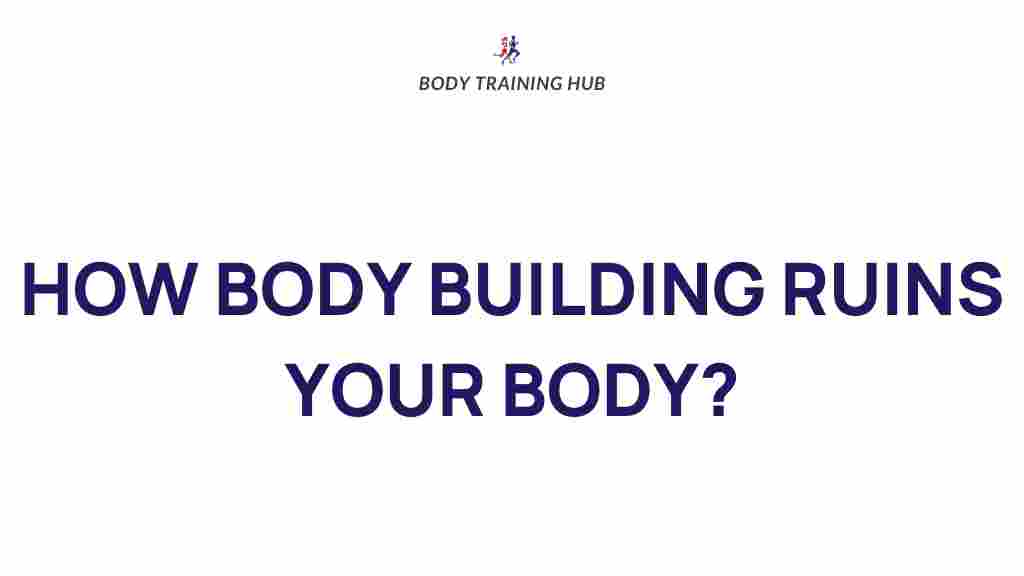The Surprising Impact of Overtraining on Your Body
When it comes to bodybuilding and physical health, the pursuit of gains often leads athletes to push their limits. However, the concept of overtraining is one that can significantly hinder progress and lead to detrimental effects on the body. In this article, we’ll explore the surprising impact of overtraining, how it relates to exercise recovery, and the symptoms of muscle fatigue that may signal it is time to dial back your training.
What is Overtraining?
Overtraining occurs when the intensity and volume of exercise exceed the body’s ability to recover. This condition can result in a range of physical and psychological symptoms that detrimentally affect performance, health, and overall well-being. Understanding overtraining is crucial for anyone engaged in intense physical activity, particularly bodybuilders who often push their limits in pursuit of muscle gain.
Signs and Symptoms of Overtraining
Recognizing the signs of overtraining is essential to maintain physical health and optimize exercise recovery. Here are some common symptoms:
- Chronic muscle fatigue: Persistent tiredness in muscles that doesn’t improve with rest.
- Decreased performance: Notable decline in strength or endurance despite continued training.
- Increased injury rate: A higher frequency of strains, sprains, and other injuries.
- Insomnia: Difficulty falling asleep or staying asleep, often leading to fatigue.
- Mood swings: Increased irritability, anxiety, or depression.
- Weakened immune response: More frequent illnesses or infections.
Understanding the Science Behind Overtraining
To better grasp the impact of overtraining, it’s vital to understand the physiological processes involved in exercise recovery and muscle fatigue. When you train, you create microscopic tears in your muscle fibers, and the recovery process involves repairing these tears, which strengthens the muscles. However, if you do not allow adequate recovery time, several negative processes can occur:
Physiological Effects of Overtraining
- Hormonal imbalances: Overtraining can lead to elevated levels of cortisol (the stress hormone) and decreased testosterone levels, which can hinder muscle growth and recovery.
- Impaired muscle recovery: Without sufficient recovery time, muscles cannot repair efficiently, leading to chronic fatigue.
- Metabolic disruptions: Overtraining can disrupt normal metabolic functions, affecting energy levels and overall performance.
The Role of Nutrition in Recovery
Nutrition plays a critical role in exercise recovery. A well-balanced diet rich in macronutrients and micronutrients aids in muscle repair and overall health. Here are some nutritional strategies to combat the effects of overtraining:
- Protein intake: Consuming adequate protein is essential for muscle repair. Aim for 1.6 to 2.2 grams of protein per kilogram of body weight.
- Hydration: Staying hydrated helps maintain performance and reduces the risk of fatigue.
- Micronutrients: Vitamins and minerals, such as Vitamin D, calcium, and magnesium, are crucial for muscle function and recovery.
Steps to Prevent Overtraining
Preventing overtraining is crucial for anyone serious about bodybuilding and physical health. Here are some effective strategies:
1. Implement a Training Plan
Develop a structured training plan that includes:
- Rest days: Ensure that you have scheduled rest days to allow your body to recover.
- Varied intensity: Mix high-intensity workouts with lower-intensity sessions to prevent burnout.
2. Listen to Your Body
Pay attention to your body’s signals. If you experience persistent fatigue or soreness, consider reducing the intensity or volume of your workouts.
3. Prioritize Recovery
Incorporate recovery techniques such as:
- Active recovery: Engage in light activities like walking or yoga on rest days to promote blood flow.
- Sleep: Aim for 7-9 hours of quality sleep each night to facilitate recovery processes.
4. Monitor Your Progress
Keep track of your workouts, noting any changes in performance or energy levels. If you observe a consistent decline, it may be a sign of overtraining.
5. Seek Professional Guidance
Consider consulting with a fitness professional or a coach who can help tailor a program suited to your needs and monitor your progress effectively.
Troubleshooting Tips for Overtraining
If you suspect you are experiencing overtraining, here are some troubleshooting tips to help you recover:
1. Take a Break
Sometimes the best option is to take a break from training altogether. This could mean taking a few days to a week off to allow your body to heal.
2. Reassess Your Goals
Review your fitness goals and consider whether they are realistic given your current training routine.
3. Consider Cross-Training
Engaging in different forms of exercise can provide a break from your usual routine while still maintaining fitness levels.
4. Focus on Mental Health
Overtraining can also lead to mental fatigue. Consider practices like meditation or mindfulness to help reduce stress and improve your overall well-being.
Conclusion
Understanding the impact of overtraining is vital for anyone involved in bodybuilding and committed to physical health. Recognizing the signs of muscle fatigue and taking proactive measures to prevent overtraining can make a significant difference in your training journey. Remember, success in bodybuilding is not just about pushing harder; it’s also about smart training, proper nutrition, and adequate recovery. By prioritizing your body’s needs, you can achieve your fitness goals without compromising your health.
For more information on effective training strategies and recovery techniques, check out this resource. To dive deeper into the science of exercise and muscle fatigue, visit this link.
This article is in the category Strength & Recovery and created by BodyTraining Team
